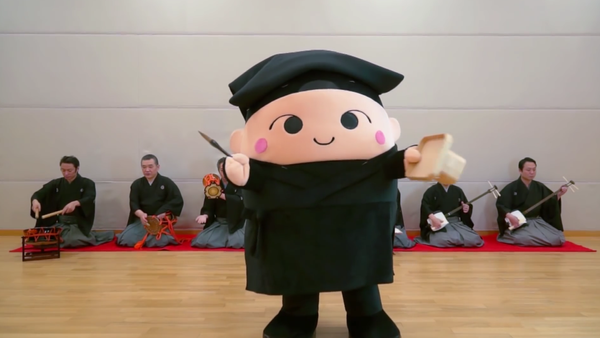Do you remember Piko Taro, that leopard print-clad Japanese comedian who took the Internet by storm with his bizarre song “Pen-Pineapple-Apple-Pen” a.k.a. PPAP?
In Japan every three-year-old knows his name now. The song was endorsed by the likes of Justin Bieber and MIA, and was rehashed by demon Ryuk from the Death Note anime series…
monsters from Sesame Street…
and even a famous Japanese singer Masashi Sada.
And all of them managed to obtain hundreds of thousands of views and likes jumping on board Piko Taro’s train to fame.
But now get ready to see the most highbrow version of this fun song that will definitely grab your attention as Japan’s National Theater funneled all their craft into a Kabuki version of PAPP.
The master musicians in the video usually play more traditional settings such as backing tracks to the National Theater's Kabuki performances. Their version of PPAP they played on traditional Japanese musical instruments dressed in formal outfits and with remarkable stone faces.
The video also features the National Theater's mascot Kurogo-chan (“Black-robed stagehand”) doing all the odd dancing at the front not with pen, apple and pineapple, but with a retro pen, a sampo (a wooden stand used in shrines) and nurisampo (a lacquered stand used in shrines), which contributes to the traditional highbrow flavor of the cover version.
The vocals are led by Saki Kineya, a young musician who comes from a family of traditional Hougaku singers with a four-hundred-year lineage and performs PPAP in a true classical style, using exclusively traditional techniques that take years to master.
According to the National Theatre this unusual video was designed to promote interest in traditional Japanese arts, especially in 2017, when the Theater celebrates its 50th anniversary. Reportedly the idea was initially suggested by highly-respected Kabuki actor Onoe Kikugoro VII in December 2016.
The video labeled “Pen-Nurisampo-Sampo-Pen” (PNSP) was uploaded on the National Theatre’s YouTube channel on January 13 and has received almost 1,715,000 views and lots of praise.
The user Punie Tanaka wrote: “Nowadays Kabuki is perceived as formal, highbrow art, but it originally it was created to amuse people. That’s why this joke can be called a return to Kabuki's original light-hearted origins.”
Never miss a story again — sign up to our Telegram channel and we'll keep you up to speed!





